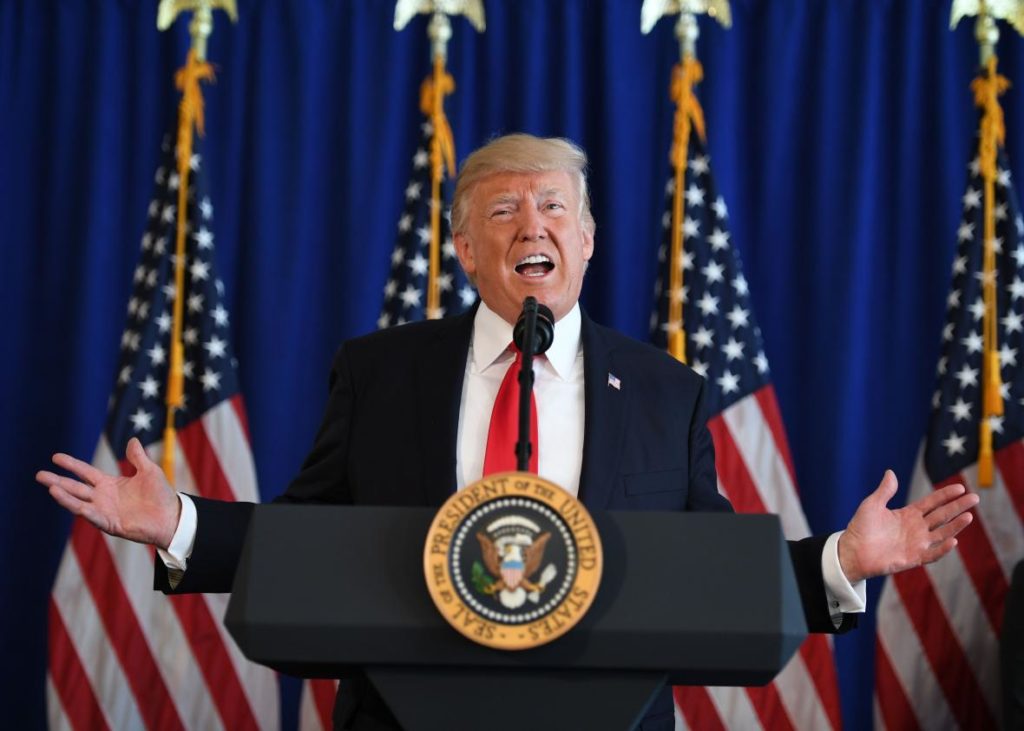
Since he became president, Donald Trump has insulted just about everybody with whom he has interacted. The one exception seems to have been close family members. They are not insulted, but when in disfavor simply ignored. He also has insulted every country on the globe, with the possible exception of Israel.
Insults seem to be a tool defining Trumpism, one that he uses constantly and with relish. There are two questions for the analyst of Trumpism. Why does he do it? And do they work?
Some analysts attribute these ceaseless insults, which recur with varying targets, as the result of some kind of mental defect. He is a hypersensitive megalomaniac, they say. He can’t restrain himself. He has no self-control.
I disagree. I believe the insults are part of a deliberate strategy, which Trump thinks will best further (1) his dominance of the U.S. and world scene and (2) the implementing of his policies.
What might Trump think he gets out of the game of insults? When he insults a person or a country, he forces them to make a decision. They can either strike back and risk Trump’s willingness to hurt them in some way important to them. Or they can seek to return to favor by making some concession important to Trump. In either case, the relationship centers around Trump.
In his view, this makes him the alpha-dog. Furthermore, he not only wants to be the top of the world power scale, but he wants to be seen to be. Insults serve this purpose.
Faced with choosing between two undesirable responses to the insult, the person or country insulted can try to make an alliance with others being insulted in similar ways or at the same time. It turns out that the potential allies are having the same debate about the way to handle the insults. The potential ally may be making a different choice of response.
At this point, the person or country insulted can try to persuade the potential ally to change tactics. Or he can look for other potential allies. In either case, rather than focusing on how to handle Trump’s insults, they are focusing on how to obtain allies. They are thus diverted from the main issue, to the benefit of Trump.
Trump can then shift tactics. He can offer some partial concession to the person or country being insulted. He can do it in a way that is ambiguous or is time limited. The person or country involved must choose between swallowing the past humiliation and offering gratitude for the concession or considering it insufficient.
If the choice is gratitude, the person or country lives under the sword of Damocles that the insult will nonetheless recur. Or he can suffer the wrath of Trump. In either case, Trump comes out ahead.
He can use this tactic to appease critics to his right or to his left. Indeed, this will help him emerge as the reasonable center, no matter what are the actual policies he pursues.
One last advantage. Since Trump’s tweets are inconsistent, he can claim credit when the outcome is favorable to him (“I deserve a Nobel prize”). But whenever the outcome is not as favorable as he desires, he can blame some or all of his inner circle, asserting that they failed to follow his instructions.
We now must turn to the question of whether the insults work. Do they have the benefits to Trump that he expects to obtain? We have to start with what Trump must find worrying. He has very high unpopularity ratings in the U.S. polls. And in the vast majority of nations, he also rates low in the polls.
He is quite unsure of winning the elections of 2018 and 2020. His conservative base is unhappy, which may lead to abstentions from voting on their part, or at least less effort to get out the conservative vote.
Nevertheless, despite this weak showing, the game of insults seems to have increased, if only slightly, his support level. Is this enough for his primary immediate purpose, getting re-elected? He needs to present to the voters and to other nations some achievements.
He has a few. On the U.S. scene, he has the tax reduction bill. And on the world scene, he has (as of now) the forthcoming meeting with North Korea’s Leader Kim. But he also has failures. He has not been able to get (yet) his planned immigration measures nor the money for the wall. And worldwide his rejection of the Iran agreement has dismayed most nations.
The question is whether the response to the insults will tilt seriously against him. It is hard to say. It could come suddenly. Or he might scrape through the morass. The real point is that the pluses of the insults cannot go on forever. Too many people and too many nations lose too much as a result.
The question therefore is not whether, but when. This is the game we are all now playing day by day, in elections at every conceivable level, in reformulated alliances across the globe. Not whether, but when!
Immanuel Wallerstein, Senior Research Scholar at Yale University, is the author of The Decline of American Power: The U.S. in a Chaotic World (New Press).
